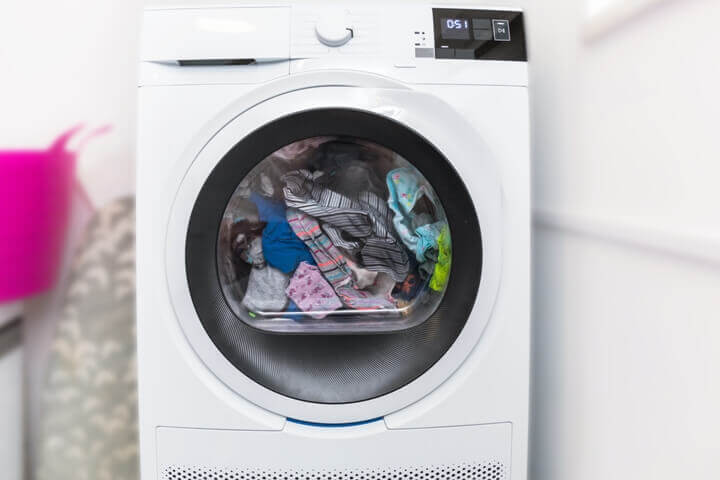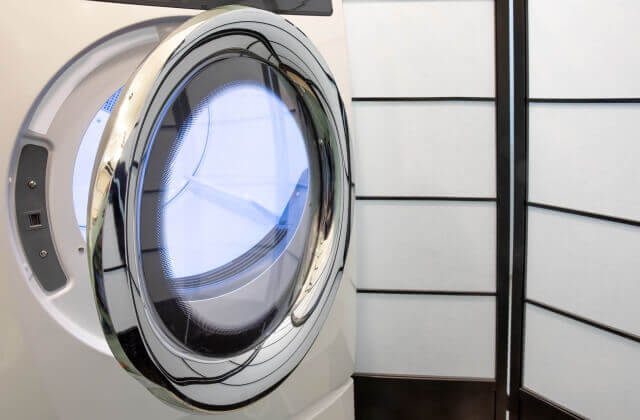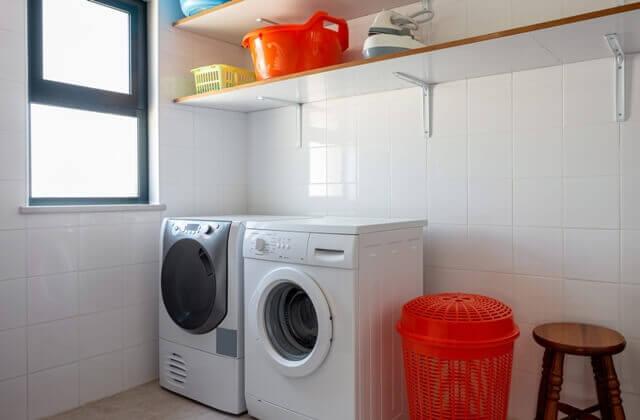Comparison: Electric Dryers vs. Gas Dryers

When you are on the hunt for a new dryer you’re going to have a couple of important decisions to make, but none of those decisions are as important as choosing the power source for your new dryer.
As one of the premier appliance repair Ottawa-based companies around we have seen our fair share of dryers that need a little bit of care, need a little bit of maintenance, and even need components repaired or replaced.
To put it bluntly, we know how to tell a fantastic dryer that will serve you well for years and years to come apart from a dryer that you should probably avoid if at all possible – and that’s why we have put together this detailed guide.
Below we share all of the inside insight and information we’ve been able to build up over the years as one of the best appliance repair companies in the Ottawa area, helping you to find the perfect dryer set up for your needs moving forward.
We dig a little bit deeper into the ins and outs of how electric and gas dryers work, and then we really plunge into the major differences between these two technologies. By the time you’re done with this guide you’ll know exactly whether or not an electric dryer or a gas dryer is best for you.
Ready to get started?
Quick Overview of an Electric Dryer
 Electric dryers are (understandably) very popular options these days and have been for decades.
Electric dryers are (understandably) very popular options these days and have been for decades.
Running off of electric power (no surprise there), your modern electric dryer is going to draw from a 240 V power supply on your wall – with all of that electricity you to heat up a gigantic coil inside of the dryer mechanism itself.
A lot of the subcompact electric dryer options on the market right now are ventless as well, something that is next to impossible to pull off when you are looking at gas powered dryers. This helps you to save some space and makes for an easier installation, but it also allows you to avoid pumping a lot of hot air and humidity into some type and confined spaces – especially spaces like the basement that are already pretty human on their own.
Electric dryers are really easy to use and really easy to setup but they are also a bit of a pain in the backside to maintain on your own. If you’re at all concerned about having to take advantage of dryer repair services in the future you may want to take a closer look at electric options, just because you’re likely to need to bring it to an appliance repair Ottawa company like ours to get it back up and running if something goes sideways.
Quick Overview of a Gas Dryer
Gas dryers are a little bit more complex and a little bit more involved than electric dryers.
These appliances run off of natural gas or liquid propane (whatever they have been designed for, though some can use both fuel sources) and you’ll need to have those kinds of lines longed directly into your home and into your laundry room if you are going to use these appliances.
You’ll also need to plug a gas dryer into a 110 V outlet in your home (the same kind of outlet that you run most of your other appliances off of), as the electrical juice there is going to be responsible for handling the heavy lifting of inputting the commands and codes into the dryer when you use it but also lighting the pilot light after a drying cycle has been started.
These kinds of appliances almost always need to be vented and can be a little bit more expensive to run over the long haul compared to electric dryers, but that’s something we dig a little deeper into in just a moment.
Choosing Between Electric and Gas Dryer Appliances
Now that you have a better idea of how these appliances work it’s time to get right into the differences between them, all in an effort to help you figure out whether or not an electric dryer or a gas dryer is right for you.
Upfront Costs
When it comes to actually purchasing a new dryer you’re going to want to expect to spend anywhere between a few hundred dollars and thousand dollars or more, regardless of whether or not you are moving forward with an electric dryer or a gas dryer.
We can tell you, though, that gas dryers are almost always going to be about $100-$200 more expensive than electric dryers that are in the same class. Everything else being equal you’ll probably spend a little bit more money upfront on gas dryers.
We also want to tell you that the installation costs of electric dryers and gas dryers can bury all over the place, something that we as a premier appliance repair Ottawa company find ourselves telling our clients all the time when they want to switch from one heating technology to another.
Most modern homes are set up with 240 V outlets in the laundry room or a dedicated laundry space, ready to rock and roll with electric dryers. If a home has not been plumbed for gas or propane already that’s another major expense upfront you’ll have to anticipate, including having a gas bottle or gas line run to your home to set the plumbing up right.
Operating Costs
 Interestingly enough, though, when it comes to actually operating your new dryer appliance you’ll usually end up spending less money with a gas dryer than you would have with electric.
Interestingly enough, though, when it comes to actually operating your new dryer appliance you’ll usually end up spending less money with a gas dryer than you would have with electric.
A big part of this has to do with the fact that gas dryers simply run hotter than electric dryers will, meaning there is less time needed to actually dry a load of laundry when you have a gas set up compared to electric.
The average American family dries about five loads of laundry each week. According to appliance industry experts, that means that an electric dryer is going to cost about $130 to operate each year – whereas a gas dryer would only cost about $85 per year to operate.
That’s a decent chunk of change your going to be able to save throughout the year if you’re running a gas powered appliance compared to an electric one and it’s certainly something that you are going to want to think about before you move forward with either option.
Operating Efficiency
Gas powered dryers also have an advantage when it comes to overall operating efficiency.
To put it really simply, gas dryers take advantage of a fuel source that is much more efficient when it comes to generating heat than the electrical coils inside of dryers offer – and that means you’re going to be using less fuel and (potentially) lowering your environmental footprint at the same time.
When you have an electric dryer you are drawing power from stations that may be hundreds and hundreds of miles away from you. On top of that, those power stations are almost always generating electricity by burning fossil fuels or natural gas to begin with, and a lot of the initial energy is going to be lost somewhere along the lines of transmission just because of the natural resistance built into the wires that deliver electricity into our home.
With gas, though, you’re taking advantage of a natural fuel source that is plugged directly into your appliance and available on demand. Only enough gas is ever used to operate your new appliance and as soon as the heating elements is no longer needed the gas shuts off instantaneously.
Add in the fact that natural gas and liquid propane is almost immediately combusted and turned into heat so that there’s near zero energy loss (improving the operating efficiencies of these appliances) and it’s not hard to see why so many people make the switch to natural gas or liquid propane operated dryers when they have the opportunity to do so.
Overall Drying Results
As we highlighted above, it’s been our experience in the appliance repair Ottawa world (especially when it comes to washer repair and dryer repair) that gas powered appliances in the laundry room are going to heat up a whole lot more efficiently, a whole lot faster, and are going to reach hotter temperatures that dry your clothes quickly.
It’s not at all unreasonable to see dryer times that are anywhere between 20% and 30% shorter when you compare gas dryers to electric dryers, and some gas dryers can produce even faster dry times than that.
You won’t have to worry about waiting around for your laundry to finish when you make the switch to gas powered appliances, that’s for sure.
Those worried about gas dryers pumping out temperatures that are too harsh can rest easy, too. You’ll have a lot of control over the thermostat of your gas powered dryer compared to electric dryers to guarantee that your more delicate pieces of laundry aren’t ever roasted but instead are gently dried in a way that “one temperature” electric dryers aren’t able to pull off as successfully.
Repair and Maintenance
When it comes to appliance repair we are especially proud of the reputation we’ve built in the Ottawa area as one of the premier companies helping homeowners bring their appliances back to better than brand-new condition without having to pay to replace them completely.
We’ve worked on thousands of appliances – including a lot of washer repair and dryer repair projects – and have a little bit of extra insight into the repair and maintenance needs of both of these types of dryers.
At the end of the day we can tell you that both of these dryer types can present challenges to navigate when comes to maintenance and repair, but that (usually) gas appliances are little bit easier to work on as well.
The real important thing here, however, is to go with a trusted brand that has a sterling silver reputation for durability, longevity, and a generally simple and straightforward repair and maintenance process.
Stick to brands you know you can trust (brands that you research thoroughly) and you’ll have a whole lot less to worry about going forward for sure.
Final Verdict
All things considered, there’s definitely a couple of things that stack the deck in favor of gas powered dryers – but that doesn’t necessarily mean that they are going to be the ultimate solution for your specific situation.
Remember, if your home isn’t already set up gas powered dryers than the installation cost goes through the roof and isn’t usually something that most homeowners are going to feel comfortable taking a DIY approach to.
Anytime you are talking about running natural gas or liquid propane lines into your home there are a whole lot of levels of complexity you have to navigate, not the least of which is figuring out how you’re going to get a steady supply of this fuel source on your property – either with a bottle provided by a gas company or by taking advantage of municipal sources (if those are even available).
Then you have to worry about running the actual plumbing lines into your property, potentially punching holes in walls and then repairing those patches later on, and generally just making sure that everything is safe and secure. Natural gas and liquid propane is a pretty powerful explosive, after all, and you don’t want to have any mistakes when it comes to safely delivering that propane from the source to your appliance.
Electric dryers can be a bit more of a “drag and drop” kind of solution that just works with your set up already, but some folks are going to really appreciate all of the benefits that gas dryers bring to the table – so much so that they don’t mind jumping through the extra couple of hoops to make the switch.
Regardless of how you choose to move forward, if you have any appliance repair needs in Ottawa – whether it be with your washer and dryer, your fridge, your dishwasher, or your stove and oven – we hope that you’ll reach out to us to address those issues for you ASAP.
We are incredibly proud of the reputation we’ve built as one of the best appliance repair Ottawa companies around and look forward to helping you bring your appliances back to better than brand-new condition!
